Welcome
Dear Knowledge Network Members,
The 2020 Rural Dementia Summit proved to be even more exciting than usual as the RaDAR team pivoted to an online format. Despite anxieties over how it would all work, we wanted to continue to host the Summit and not be deterred by the Covid-19 pandemic. My thanks to the RaDAR team members who worked so hard to make it happen, to all the presenters who rose to the challenge of adapting to the virtual format, and everyone who attended. Your contributions made this venture a big success.
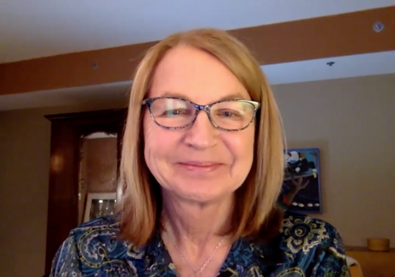
The Summit was created in 2008 as a strategy to bring together the Rural Dementia Action Research (RaDAR) team and people who share an interest in improving the quality of care and quality of life of people with dementia and their caregivers. The original intent of the Summit was to provide guidance to the RaDAR research program, but it has expanded over time to serve as a hub for sharing dementia research and innovations taking place in Saskatchewan, other parts of Canada, and internationally.
The poster session was a different experience than our usual evening gathering, but the new format with narrated Powerpoint presentations was well received. This year our keynote speaker Dr. Irene Blackberry joined us from Australia, and we were excited to have former keynote speakers Dr. Anthea Innes (UK), Dr. Stefanie Auer (Austria), and Dr. Dallas Seitz (Alberta) present virtually as well. In this year’s Lived Experiences session, the Alzheimer Society of Saskatchewan’s Joanne Michael spoke to Ida Ryhorchuk, who lives with vascular dementia. We hope that everyone found something of interest in the diverse presentations in the program.
Thank you to everyone for making time to participate in the Summit and join us on this unique journey into the virtual world. The RaDAR team is excited to be able to bring people together to exchange knowledge and experiences, and work together to improve quality of life for people living with dementia and their families.
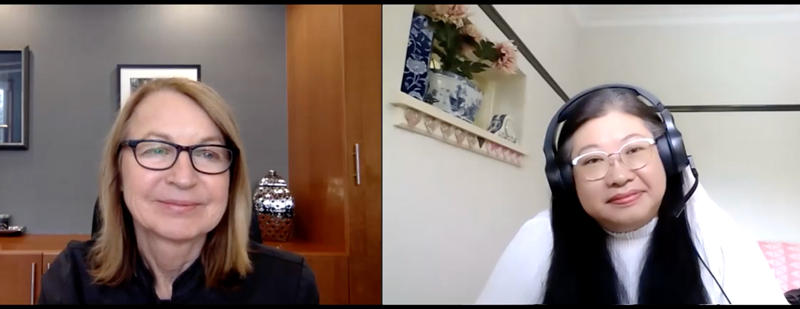
Dr. Irene Blackbery presented her keynote from Australia - watch
her presentation in the Summit Session Presentations section below
Bilokreli Family Support
Poster Presentations
The online format allowed the Summit planning team to open the poster session early -- a few days before the formal start of the Summit meeting on November 9th -- to allow ample time for registered attendees to view the posters and interact with the presenters.
Below is an archive of the 19 Summit Poster presentations that were shared. Poster presenters may be contacted via their email if you would like to ask questions.
Within the listing, we have highlighted the 4 student posters that were awarded Bilokreli Student Poster Prize awards for 2020.
We're pleased to announce the winners of this year's Bilokreli Student Poster Prizes are as follows:
Third Place: August Kortzman
Second Place (tied): Virginia Deobald, and Meghan Flath
First Place: Karl Grewal and Michaella Trites
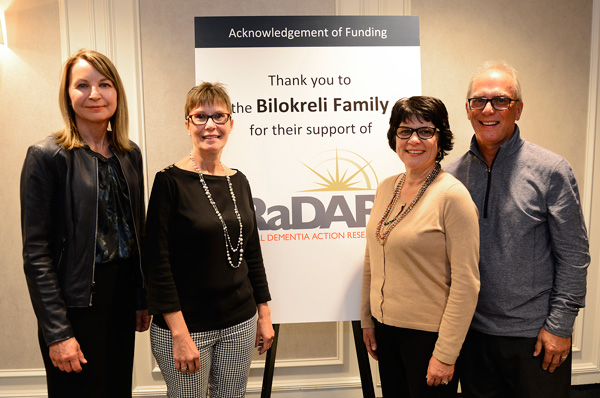
A Scoping Review of COVID-19 Experiences of People Living with Dementia.
Authors: Bacsu J, O'Connell ME, Poole L, Wighton MB, Sivananthan S, Webster C
Presented by: Juanita Bacsu of University of Saskatchewan
Bilokreli Student Poster Prize 1st Place Poster
Analysis of CVLT-II-SF Forced Choice Recognition Performance as a Function of Cognitive Status in a Rural Memory Clinic Sample.
Authors: Grewal K, Trites M, O'Connell ME, Morgan D, Kirk A, MacDonald SWS
Presented by: Karl Grewal of University of Saskatchewan, and Michaella Trites of University of Victoria
CCNA Team 15 Rural: Rural Memory Clinic Health Care Professionals' Perceptions of Targeted Dementia Care Education Sessions.
Authors: Elliot V, Morgan D, Kosteniuk J, O'Connell ME, Froehlich Chow A, Bayly M, Cameron C, Seitz D.
Presented by: Valerie Elliot with the RaDAR Team at the University of Saskatchewan
CCNA Team 15 Rural: Self-efficacy and Service/Support Needs of Primary Care Partners Accompanying Individuals Evaluated in Rural Primary Health Care Memory Clinics.
Authors: Kosteniuk J, Morgan D, O'Connell ME, Seitz D, Cameron C, Elliot V, Bayly M, Froehlich Chow A.
Presented by: Julie Kosteniuk with the RaDAR Team at the University of Saskatchewan
Evaluating the Social Impact of Dementia Friendly Walking Football.
Authors: MacRae R, Macrae E, Carlin L.
Presented by: Rhoda MacRae from the Alzheimer Scotland Centre for Policy and Practice at the University of the West of Scotland
Exploring Nurse Practitioner Preferences for Learning about Dementia and Driving.
Authors: Rapoport M, Byszewski A, Gélinas I, Mariano C, Stasiulis E.
Presented by: Elaine Stasiulis, Research Associate for Team 16 of the Canadian Consortium in Neurodegeneration and Aging (CCNA)
Family Caregivers' Perspectives on Supporting Pain Management in Persons Living with Dementia.
Authors: Tupper S, Gibson K, Danylyshen-Laycock T, Compton R, Hunter P, Holtslander L.
Presented by: Susan Tupper, Strategy Consultant for Pain Quality Improvement for the Saskatchewan Health Authority and co-char of the Board of Directors of SaskPain.
Bilokreli Student Poster Prize 3rd Place Poster
Impact of Young Onset Dementia on Informal Caregiver Quality of Life: A Small-Scale Qualitative Study.
Authors: Kortzman A, Bayly M, O'Connell ME.
Presented by: August Kortzman from the University of Saskatchewan.
Intraindividual Variability Measured with Dispersion Across Diagnostic Groups in a Memory Clinic Sample.
Authors: Grewal K, O'Connell ME, Kirk A, MacDonald S, Morgan D.
Presented by: Karl Grewal from the University of Saskatchewan.
Lifespace in Dementia: Identifying GPS-based Measures that Shed Light on the Mobility Habits of Older Adults with Dementia.
Authors: Bayat S, Naglie G, Rapoport M, Stasiulis E, Mihailidis A.
Presented by: Sayeh Bayat from the University of Toronto.
Bilokreli Student Poster Prize 2nd Place Poster *tie*
Living with Dementia in Rural Long Term Care Facilities: Nurses' Experience using Nonpharmacological Interventions to Treat Responsive Behaviour.
Authors: Deobald V.
Presented by: Virginia Deobald from the University of Saskatchewan.
Long-term Care Registered Dietitians' Initial Response to COVID-19.
Authors: Beitel J, Cammer A.
Presented by: Julie Beitel from the University of Saskatchewan.
Mobile Recreation Therapy Services; Private Practice, in Rural Saskatchewan and Surrounding Area.
Authors: BoserKelly D.
Presented by: Donna BoserKelly, Community Recreation Therapist.
Strategies for Scaling up Rural Primary Health Care Memory Clinics: Perspectives of Clinic Team Members and Researchers.
Authors: Morgan D, Kosteniuk J, O'Connell ME, Elliot V, Bayly M, Froehlich Chow A, Seitz D, Cameron C.
Presented by: Debra Morgan with the RaDAR Team at the University of Saskatchewan
The Alzheimer disease-related β-Amyloid peptide affects monoamine oxidase-A and -B differently.
Authors: Quartey M, Wang S, Phenix C, Mousseau D.
Presented by: Darrell Mousseau from the University of Saskatchewan.
The Effectiveness of Early-Stage Intervention on the Wellbeing of Caregivers to Persons with Mild Dementia or Mild Cognitive Impairment (MCI): A Systematic Review and Meta-Analysis.
Authors: Bayly M, Morgan D, Elliot V, Kosteniuk J, Froehlich Chow A, O'Connell ME, Peacock S.
Presented by: Melanie Bayly with the RaDAR Team at the University of Saskatchewan
Bilokreli Student Poster Prize 2nd Place Poster *tie*
The Impact of Pet Ownership, Social Support, Social Isolation, and Loneliness on Cognition and Depressive Symptoms in Older Adults.
Authors: Flath M, O'Connell ME, Cammer A, Dell C, Oremus M, Tyas S, Law J, Maxwell C, Rutter E.
Presented by: Meghan Flath with the University of Saskatchewan
Using Twitter to Understand the COVID-19 Experiences of People Living with Dementia.
Authors: acsu J, O'Connell ME, Cammer A, Grewal K, Green S, Poole L, Azizi M, Spiteri R.
Presented by: Juanita Bacsu with the University of Saskatchewan
What are the Differences in Health Service Use Between Persons with Dementia Living in Rural and Urban areas in Quebec?.
Authors: Arsenault-Lapierre G, Bui TX, Godard-Sebillotte C, Sourial N, Quesnel-Vallée A, Massamba V, Rochette L, Vedel I.
Presented by: Geneviève Arsenault-Lapierre with McGill University
Summit Session Presentations
When the online Summit opened on November 9th pre-recorded presentations were immediately available to attendees to view. A suggested viewing order/time was outlined in the event agenda. This approach was chosen to allow guests from other time zones, or with limited bandwidth, to watch and re-watch presentations at times convenient to them. A chat panel beside each presentation allowed attendees to ask questions of presenters and interact with the presentations on the platform.
A few presentations, including the Keynote presentation by Dr. Irene Blackberry, were delivered live via Zoom Webinar with a live Q&A session. These live sessions were recorded and later made available on the platform for those who were unable to join at the live start time.
Below this Summit agenda is a stack of tabs with more information about the presentations that were shared on the 9th and 10th.
|
Day |
Start Time |
Session Name |
Type |
|
Mon, Nov 9 |
4:30 PM |
Welcome to Summit Online Platform |
Information |
|
|
|
SUPPORT PROGRAMS AND TECHNOLOGY - sessions i, ii, iii |
|
|
Mon, Nov 9 |
4:40 PM |
i) Pre-Recorded: Interventions to Enhance Social Inclusion of Older Adults with Dementia in Saskatchewan - Presented by Dr. Bonnie Jeffery & Michelle Harazny |
Pre-Recorded session |
|
Mon, Nov 9 |
4:55 PM |
ii) Pre-Recorded: An App to Support Care Partners of People with Dementia - Presented by Dr. Donna Goodridge |
Pre-Recorded session |
|
Mon, Nov 9 |
5:10 PM |
iii) Pre-Recorded: Alzheimer Society of Saskatchewan Programming update - Presented by: Heather Van Starkenburg and Laura Steeves-Green |
Pre-Recorded session |
|
|
|
DEMENTIA ASSESSMENT - sessions a, b, c |
|
|
Mon, Nov 9 |
5:25 PM |
a) Pre-Recorded International Researcher: Title Pending -Presented by Dr. Stefanie Auer |
Pre-Recorded session |
|
Mon, Nov 9 |
5:40 PM |
b) Pre-Recorded: Geriatric Services Outpatient Clinic (Regina, SK) - Presented by: Clinic Team members |
Pre-Recorded session |
|
Mon, Nov 9 |
6:00 PM |
c) Pre-Recorded: RRMC Contribution to Gathering Evidence for Validity for the Canadian Indigenous Cognitive Assessment - Presented by Dr. Megan O'Connell |
Pre-Recorded session |
|
Mon, Nov 9 |
6:15 PM |
Pre-Recorded International Researcher: Approaches to working in partnership with people living with dementia: some examples from the UK - Presented by Dr. Anthea Innes |
Pre-Recorded session |
|
Mon, Nov 9 |
6:32 PM |
*LIVE* Starts 6:32 PM Monday - Welcome to Summit and Poster Session Greetings with Dr. Debra Morgan |
LIVE SESSION |
|
Mon, Nov 9 |
6:45 PM |
Poster Session 6:45 pm to 8:00 pm - poster presenters have been asked to be online during this period to respond to messages about their posters |
|
|
Day |
StartTime |
SessionName |
Type |
|
Tues, Nov 10 |
11:30 AM |
Pre-Recorded: Welcome to Summit 2020 and RaDAR Team Updates -Presented by Dr. Debra Morgan |
Pre-Recorded session |
|
Tues, Nov 10 |
12:03PM |
*LIVE* Starts 12:03 pm Tuesday - Adaptations to the RRMC: The vRRMC, RRMC2.0 & the RRMCi - Presented by Dr. Megan O'Connell |
LIVE SESSION |
|
Tues, Nov 10 |
12:40PM |
Pre-Recorded: Seeing is Believing - a Brief Exploration of Disorders of Visual Processing - Presented by Dr. Andrew Kirk |
Pre-Recorded session |
|
Tues, Nov 10 |
12:54PM |
RURAL PHC MEMORY CLINICS - sessions 1 & 2 |
|
|
Tues, Nov 10 |
12:55PM |
1) Pre-Recorded: Rural Primary Health Care Memory Clinics Video and Podcast Featuring Family Story of Support from Clinic in Kipling, SK |
Pre-Recorded session |
|
Tues, Nov 10 |
1:15 PM |
2) Pre-Recorded: Kipling, SK, Active Living Program - Presented by Tracy Hack and Jean Daku |
Pre-Recorded session |
|
Tues, Nov 10 |
1:33 PM |
*LIVE* Starts 1:33 pm Tuesday - Lived Experiences Panel -Featuring Ida Ryhorchuk and Joanne Michael |
LIVE SESSION |
|
Tues, Nov 10 |
2:00 PM |
Networking Break |
Information |
|
Tues, Nov 10 |
2:14 PM |
ACUTE AND LONG TERM CARE - sessions A & B |
|
|
Tues, Nov 10 |
2:15 PM |
A) Pre-Recorded: Championing Dementia Care in Acute Care Settings - Presented by Dr. Shelley Peacock |
Pre-Recorded session |
|
Tues, Nov 10 |
2:30 PM |
B) Pre-Recorded: Not just a visitor: The essential role of family members in long-term care - Presented by the Saskatchewan LTC Network |
Pre-Recorded session |
|
Tues, Nov 10 |
2:45 PM |
Pre-Recorded: Relationships between Mental Health Problems and Risk of Dementia - Presented by Dr. Dallas Seitz |
Pre-Recorded session |
|
Tues, Nov 10 |
3:18 PM |
*LIVE* Starts 3:18 pm Tuesday – International guest Keynote Presentation: Dr. Irene Blackberry |
LIVE SESSION |
|
Tues, Nov 10 |
4:05 PM |
Thank You - End of Summit Meeting and Evaluation |
Information |
Presenters Dr. Bonnie Jeffery, and Michelle Harazny with the University of Regina provided information about the work of their team.
During the presentation, Dr. Jeffery mentions their project website - visit the site https://www2.uregina.ca/SPHERU-dementiasupports/ to learn more and to sign up for their newsletter.
The team also maintains a Twitter profile and Facebook profile too - be sure to check them out!
Get in touch with presenters: bonnie.jeffery@uregina.ca or michelle.harazny@uregina.ca
Presenter Dr. Donna Goodridge provided an overview, on behalf of her team, about their app created to support care partners of people with dementia.
Get in touch with the presenter: donna.goodridge@usask.ca
Presenters Laura Steeves-Green and Heather Van Starkenburg with the Alzheimers Society of Saskatchewan provided an update about the Society's programming including:
- Programs and Services Available
- How they have moved to Online program delivery
- Roles of First Link Care Navigator and new Diagnosis and Support Coordinator
- How to make a First Link referral
Laura and Heather have provided a First Link Referral Form and more information about making a referral to the First Link program.
Want to learn more, get in touch with presenters: lsteeves-green@alzheimer.sk.ca or hvanstarkenburg@alzheimer.sk.ca
Dr. Auer was the 11th Annual Summit meeting Keynote presenter where she provided information about the development of the Dementia Service Centres in Austria - we are pleased that she is able to return to provide this update on the Centres.
Dr. Stefanie Auer is Professor for Dementia Studies in the Department of Clinical Neurosciences and Preventive Medicine at the Danube University Krems, Austria. She also serves as Scientific Director of the MAS Alzheimerhilfe in Upper Austria.
Get in touch with the presenter: Stefanie.Auer@mas.or.at
Dr. Megan O'Connell, RaDAR Team Investigator and Neuropsychologist with the Rural and Remote Memory Clinic (RRMC) in Saskatoon presents about work done by the team at the RRMC to contribute to validating the Canadian Indigenous Cognitive Assessment (CICA) Screening tool.
Get in touch with the presenter: megan.oconnell@usask.ca
We were pleased to welcome international guest researcher and RaDAR Team Co-investigator, Dr. Anthea Innes with Salford institue for Dementia (University of Salford, UK).
Dr. Innes has twice visited Saskatoon as a keynote presenter at Summit 2 and Summit 7.
Get in touch with the presenter: innesa2@mcmaster.ca
This session was originally offered live as a Zoom Webinar - the video posted is a recording of the session.
Dr. Debra Morgan, RaDAR Team Lead, welcomed everyone to Summit 2020, and introduced the evening poster session which started the first evening of Summit.
Get in touch with the presenter: debra.morgan@usask.ca
To begin the second day of the Summit meeting, Dr. Debra Morgan provided an overview of the history of the RaDAR team and the Summit event, and gave an update on current RaDAR team projects.
The updates included information about a new text book co-edited by Dr. Morgan, as well as updates about the Rural Primary Healthcare Memory Clinics.
Get in touch with the presenter: debra.morgan@usask.ca
This session was originally offered live as a Zoom Webinar - the video posted is a recording of the session.
Dr. Megan O'Connell, RaDAR Team Investigator and Neuropsychologist with the Rural and Remote Memory Clinic (RRMC) in Saskatoon presented about adaptations made to the RRMC.
These changes include those made due to stakeholder feedback from previous Summits, and adaptations made in response to COVID-19.
Connect or refer to remotely-delivered services that Dr. O'Connell mentions in her presentation: www.remotememoryclinic.ca
Get in touch with the presenter: megan.oconnell@usask.ca
Dr. Andrew Kirk, neurologist and RaDAR Team member provided an overview of a number of disorders of visual processing.
Get in touch with the presenter: andrew.kirk@usask.ca
This session was originally offered live as a Zoom Webinar - the video posted is a recording of the session.
Ida Ryhorchuk, in conversation with Joanne Michael of the Alzheimer Society of Saskatchewan, shared her personal experience of living with dementia.
A live Q&A was hosted by Dr. Debra Morgan during which Ida and Joanne responded to questions submitted from Summit participants.
Get in touch with the presenter: jmichael@alzheimer.sk.ca
Dr. Shelley Peacock with the College of Nursing at the University of Saskatchewan presents on her research project to adapt a successful Scottish Dementia Education training program and adapt it for use in Canada to improve care in acute care settings for those with dementia.
Learn more about Dementia Champions Canada.
Get in touch with the presenter: shelley.peacock@usask.ca
The SK LTC Network is an independent collective of family members, researchers, clinicians, and trainees that formed in March 2020. We work together to provide evidence- and experience- informed strategies to long-term care stakeholders during the pandemic and beyond. Our work is founded on the belief that strong relationships between residents, families, health providers, and decision-makers is the key to a strong long-term care system.
In this video presentation, SK LTC Network members explore reactions to complicated issues related to the pandemic in response to the following questions: What challenges are families encountering during the pandemic? Why is it important that long-term care become more relationship-centred? What is your vision for family presence in long-term care? What would it look like if families were integrated into care teams? What are some promising directions related to family presence in long-term care?
Get in touch with the presenters: skltcnetwork@usask.ca
Dr. Dallas Seitz, a Geriatric Psychiatrist at University of Calgary, presented on the relationships between depression, serious mental illness (bipolar/schizophrenia) and substance use disorders as risk factors for dementia.
Dr. Seitz is a collaborator with the RaDAR team on research projects and the PC-DATA tool he developed has been adapted for use among the Rural PHC Teams in Saskatchewan. Dr. Seitz was a Keynote Presenter at Summit 8 in Saskatoon and we're pleased he was able to be back to present at Summit 2020!
Get in touch with the presenter: dallas.seitz@ucalgary.ca
This session was originally offered live as a Zoom Webinar - the video posted is a recording of the session.
Dr. Irene Blackberry is the John Richards Chair of Rural Ageing and Aged Care Research at La Trobe University, Australia. We are pleased that she was able to join us as our Keynote Presenter for Summit 2020!
In her presentation Dr. Blackberry mentioned four short video stories about Verily Connect, you can view these videos online:
- Verily Connect Project Overview
- Verily Connect Carers' Experiences
- Verily Connect Health Services Partners
- Verily Connect Volunteers
Get in touch with the presenter: i.blackberry@latrobe.edu.au
Event Evaluation
Attendees were given opportunities to rate and provide feedback on each session as they attended. This information was anonymized and shared back with individual session presenters.
We also invited all attendees to complete a post-event evaluation of their entire Summit experience, with an incentive prize drawn from all who completed the survey. The winners of the draw were Relna K. and Barb U. who each received a $50 Visa gift card.
The online platform reported that 126 attendees logged in to attend Summit 2020. Of those who attended, 60 individuals chose to complete the post-event evaluation survey. From the evaluations we learned the following (note that some respondents did not answer every question asked).
-We learned that 77% of respondents had attended a previous, in-person, Summit meeting [n=44], whereas 23% were joining us for the first time at Summit 2020 Online [n=13].
-Respondents came from a wide variety of backgrounds:
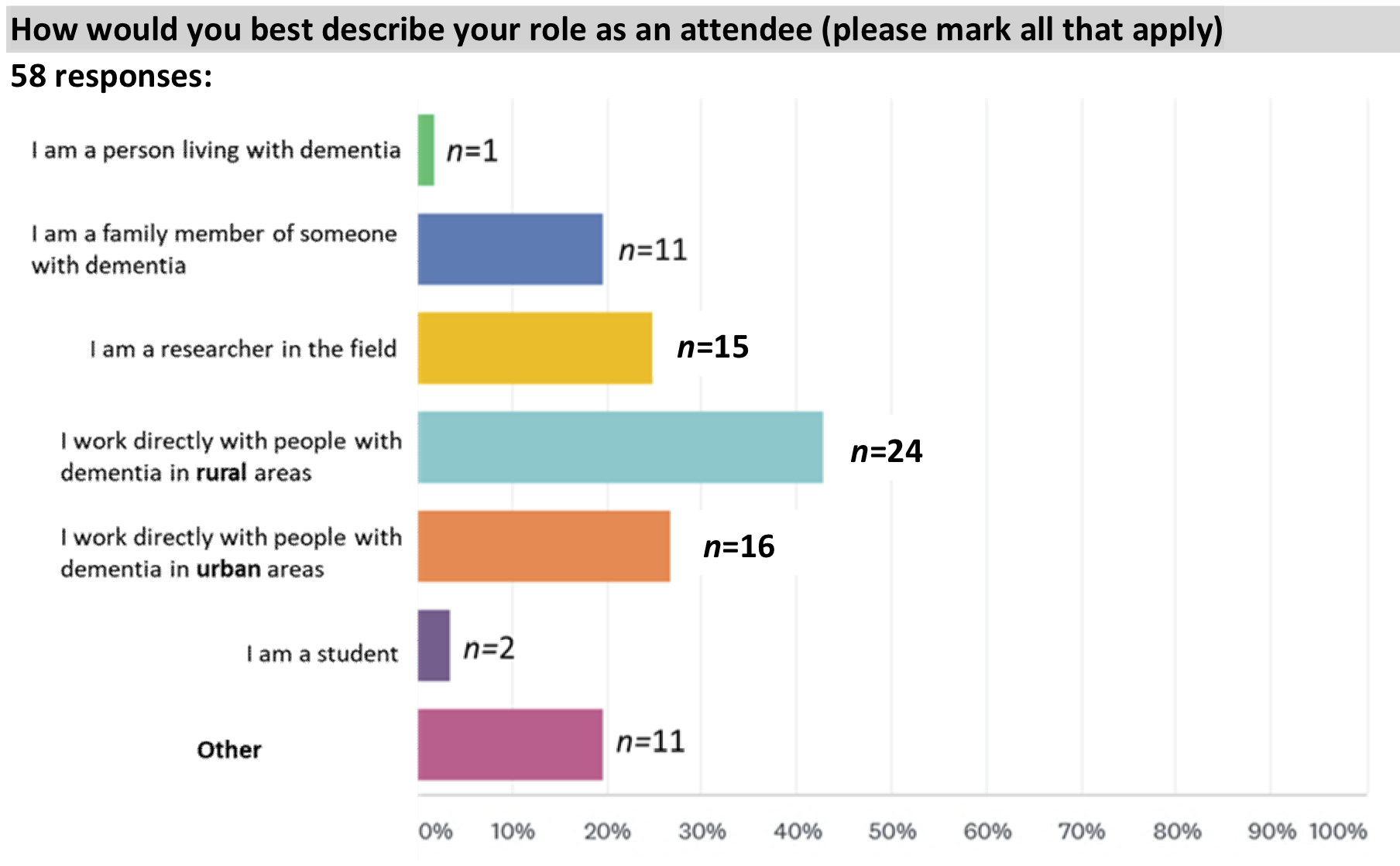
-The majority of respondents did take time to view the posters in the pre-Summit Poster Session:
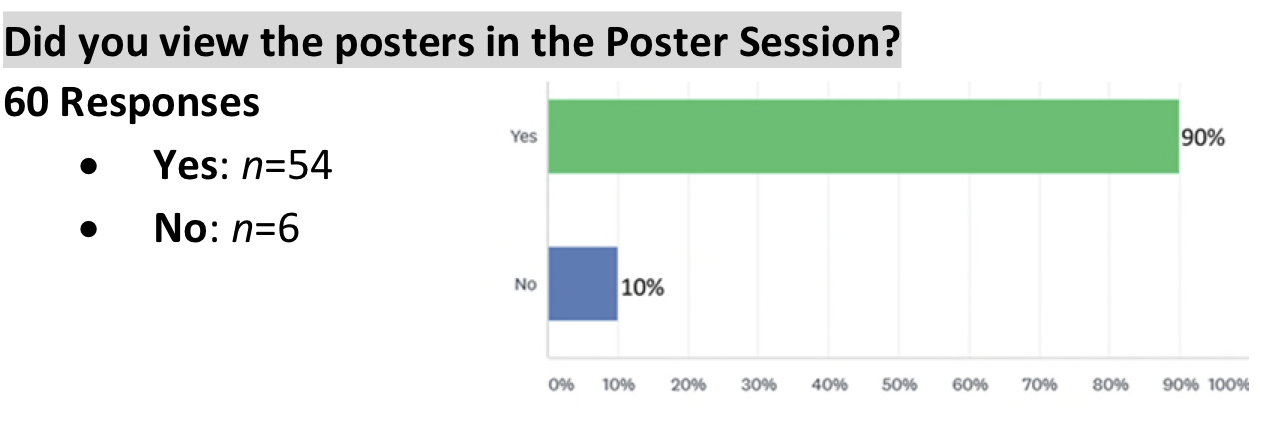
-Respondents rated the Poster Session favourably, including the virtual format of the poster session this year (as compared to in-person Poster Sessions at past Summit meetings).
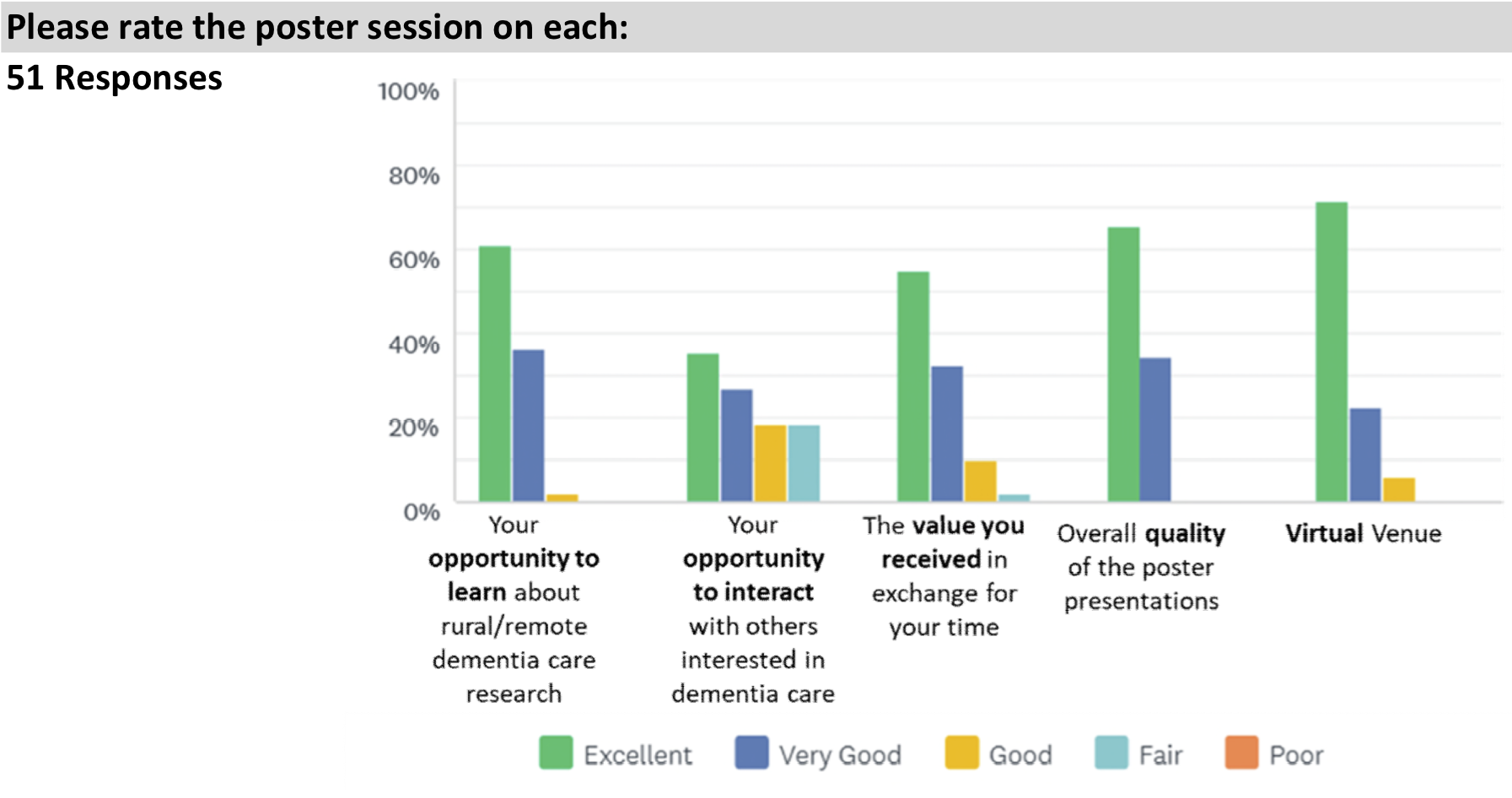
The survey also included a number of open-ended questions about attendees experiences of the event.
From the open-ended feedback we learned that the online-delivered poster session was a format that was appreciated by many respondents. We specifically heard how the online format allowed them to spend more time reviewing the content of posters that interested them and facilitated better communication with the poster presenter versus respondents' previous experience with in-person poster sessions. The short-recordings/presentations accompanying each poster were also very much appreciated. However, there was also an acknowledgement that the social interaction as had been enjoyed at past in-person poster sessions was lacking.
About the Summit event over-all we heard positive feedback:
- the Online Platform was easy to navigate, and worked well
- the mix of pre-recorded and live presentations and the flexibility allowed respondents to watch/re-watch content tailored to their own pace/schedule
- the diversity of researchers, clinicians, and patients/caregivers that were in attendance
- no travel worries - being able to stay home, safe, but still participate in Summit 2020 and meet others working in rural dementia care
- there was a financial savings for attendees who didn't need to travel to attend
- hearing the personal experience and voice of people living with dementia
- the mix of local/national presenters and the inclusion of a number of international guests (including this year's Keynote presenter) was appreciated
- the ability to interact with the presenters and network with others (virtually) on the Online Platform
- the Summit Games was a fun way to encourage interaction, as well as the participant profiles for each attendee.
We also heard some feedback about how we could improve, or about what was missing without the in-person experience this year:
- virtual networking opportunities were limited, many respondents missed the in-person networking and personal connection of meeting colleagues face-to-face
- time zone differences for some meant that they could not participate in the live session(s) and had to watch the recording after the fact
- it was a long time to sit at a computer/device
- for some, the online format added a learning curve for a new platform, and there were some techinical glitches for some users
- a number of respondents who have attended past Summit meetings reported that they missed the venue and excellent catering that has been part of previous Summit events
- in-person events make it easier to 'leave work behind', whereas the virtual format made it harder to ignore other emails/notifications on computer while attending
Many survey respondents let us know that the positives outweighed the areas for improvement, and that the RaDAR Team's efforts to shift to an online event for 2020 were much appreciated.
The RaDAR team will use the invaluable feedback we received from the survey to help us plan for the next Summit, and to tailor other on-line events.
We're pleased to share some quotes, direct from the evaluation survey, with you below:
"Thank you very much for offering the Summit this year. The RaDAR team and all the presenters
did an outstanding job shifting to a virtual format. I feel grateful for the opportunity to attend
this event."
[commenting on the Poster Session] "The addition of videos for consistent information provision and the ability to ask questions without being interrupted or distracted by in-person attendees was very appreciated. Lots of great research out there! Congratulations to RaDAR for a very successful shift from an in-person poster session to a virtual one."
". . . if it was not virtual I would not have been able to attend due to cost."
"Safety. Accessibility.... greater opportunity to connect with more people over the period of
time...in-person coffee breaks are often so rushed you only have time to go to the washroom and talk to one or two other people....with this setup, I was able to correspond with and ask questions of multiple people throughout the day. I networked more in this format than I would have in-person!"
"The great mix of researchers, clinicians, and patients/caregivers. The fact that I could tailor the
time of some presentations to my schedule because they were asynchronous (with one big
caveat of not being able to discuss with the presenters, really)"
"Hearing from the broad spectrum of people - from researchers - to patients diagnosed with
dementia and their families - to front line workers. Regardless of your interest, the Summit
provided something for everyone."
"The online summit allowed researchers to know that they aren't alone and that research in
the field continues despite the current pandemic."
"The game component was neat and encouraged me to interact more"
". . . Summit is an amazing opportunity to learn about the research going on in
the field and to hear from individuals with dementia, health care practitioners in the field, administrators in the field, and carers. I always come away with incredibly valuable knowledge and a new perspective on dementia and dementia research."
"A high quality conference with high caliber presenters and a local focus that provides
opportunities to learn and incorporate information immediately. It also offers inspiration and a reminder to be proud of the great work being undertaken right here in the province by local talent!"
"Last years summit was actually one of the major influences for my current proposed project. Summit also provided me with an amazing opportunity to receive feedback on my proposed research."
"Having the presentations pre-recorded ahead of time and available both before the conference officially started and after, was very convenient and allowed participants time think about the information they were hearing. I found the range of topics and presentations given by researchers, patients and their families, caregivers, and everyone else involved in the process so helpful. Presenters were prepared and because of time constraints, did not go beyond their allotted time - which is always a good thing! . . . the online summit was proof that technology can definitely overcome the challenges of distance!"
"Thank you . . . RaDAR team for providing us with a meaningful way to still connect, learn and share. I know if was a great deal of extra work but was in my opinion an overall success"
Summit Games Prizes
To engage online participants with the Summit content, and to encourage networking in the online space, two rounds of Summit Games were held during the event. Participants accumulated points for messaging with the poster presenters about their presentations, and for finding answers to clues within the content of the presentations.
The winners of the Monday Summit games were:
| 1st Place | 2nd Place | 3rd Place |
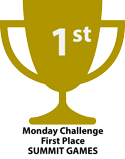 |
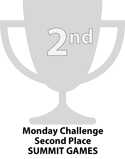 |
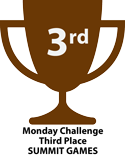 |
| Heather D. | Cathy B. | Juanita B. |
The winners of the Tuesday Summit games were:
| 1st Place | 2nd Place | 3rd Place |
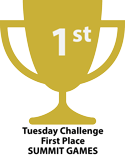 |
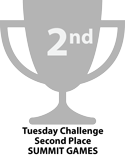 |
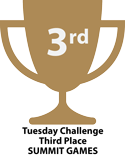 |
| Abby W. | Elham M. | Cathy B. |

